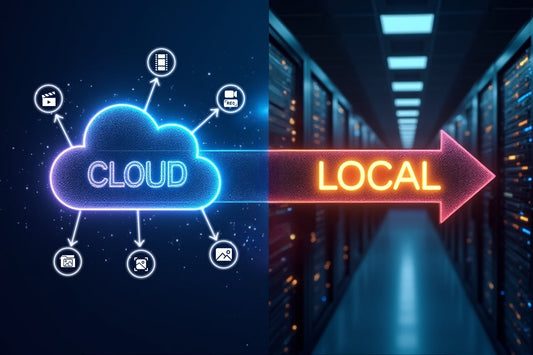
Local vs. Cloud Storage for Smart Cameras: Which Option Fits Your Needs in Pakistan?
Choosing the right storage option for your smart security cameras is critical for reliability, privacy, and cost-efficiency. In Pakistan, where electricity load shedding and inconsistent internet speeds are everyday challenges, the decision between local storage (SD cards, DVR/NVR) and cloud storage becomes even more important especially for smart home automation. This guide compares both options so you can decide which fits your home or business security needs best.
What is Local Storage for Smart Cameras?
Local storage means video footage is saved directly on a memory card, DVR (Digital Video Recorder), NVR (Network Video Recorder), or external hard drive.
Pros of Local Storage
- One-time cost — pay for SD card or DVR once, no monthly fees.
- Works offline — camera keeps recording even if internet goes down.
- Data privacy — footage stays in your possession.
Cons of Local Storage
- Risk of theft or damage — if DVR or SD card is stolen, data is lost.
- Limited storage capacity — older files overwrite when memory fills up.
- No remote access unless connected to internet-enabled DVR.
What is Cloud Storage for Smart Cameras?
Cloud storage means your camera uploads video footage to an online server hosted by the camera provider (Google, Ezviz, Ring, Hikvision, etc.).
Pros of Cloud Storage
- Remote access — watch live or recorded footage from anywhere.
- Automatic backup — even if the camera is stolen, videos remain safe online.
- Scalable storage — upgrade to bigger plans as needed.
Cons of Cloud Storage
- Subscription costs — typically $5–$15/month (~PKR 1,400–4,200).
- Internet dependency — slow speeds or outages disrupt uploads.
- Data privacy concerns — footage stored on third-party servers.
Pakistan-Specific Considerations
Unlike markets with stable infrastructure, Pakistan has unique challenges:
- Load Shedding → Local DVRs with battery backup are more reliable during outages.
- Internet Speed & Stability → Cloud storage may lag if using slower ISPs (PTCL ADSL). Fiber ISPs like Nayatel or StormFiber perform better.
- Cost Sensitivity → Many households prefer one-time SD card or DVR investment over recurring USD-based subscriptions.
- Data Sovereignty → Cloud servers are usually abroad, raising concerns about surveillance and data misuse.
Local vs. Cloud: A Quick Comparison
| Feature | Local Storage (SD/DVR/NVR) | Cloud Storage (Online Servers) |
|---|---|---|
| Cost | One-time (PKR 2,000–30,000) | Ongoing (PKR 1,400–4,200/month) |
| Reliability | Works offline, load shedding-friendly | Depends on stable internet |
| Security | Private but vulnerable to theft | Safer against theft, but privacy risk |
| Scalability | Limited capacity (64GB–4TB) | Expandable with subscription |
| Ease of Access | On-site playback only | Remote access from anywhere |
Which Option Fits Your Needs?
- For Families in Pakistan → Local storage with DVR + UPS backup ensures security even during power outages.
- For Small Businesses → Hybrid storage (DVR + optional cloud backup) balances reliability and safety.
- For Apartments/Remote Monitoring → Cloud storage is ideal if you have stable fiber internet.
- For Budget Users → SD card–based local storage avoids monthly costs.
Hybrid Storage: The Best of Both Worlds
Some smart cameras now offer hybrid storage, where footage is saved on both an SD card and the cloud. This gives you local reliability plus remote access a practical solution for Pakistan’s environment.
Final Thoughts
In Pakistan, where load shedding and internet issues are real, local storage remains the most reliable choice for everyday use. However, if you want remote access and don’t mind subscription costs, cloud storage or hybrid setups can add extra peace of mind.
When buying a smart camera, consider important camera features such as your budget, internet reliability, and privacy needs before making the decision.
FAQs
Which is safer for Pakistani users, local or cloud storage?
Local storage keeps data private, while cloud storage prevents data loss from theft. Hybrid storage is the safest balance.
Do smart cameras work in Pakistan without internet?
Yes. With local storage (SD/DVR), cameras continue recording even without internet.
How much does cloud storage cost for smart cameras?
Typically $5–$15/month (~PKR 1,400–4,200), depending on provider.
What’s the best option for businesses in Pakistan?
Hybrid storage (local + cloud) with UPS backup is best for shops and offices.
Can I expand storage without paying monthly?
Yes, use larger SD cards or connect a DVR/NAS system for one-time investment.